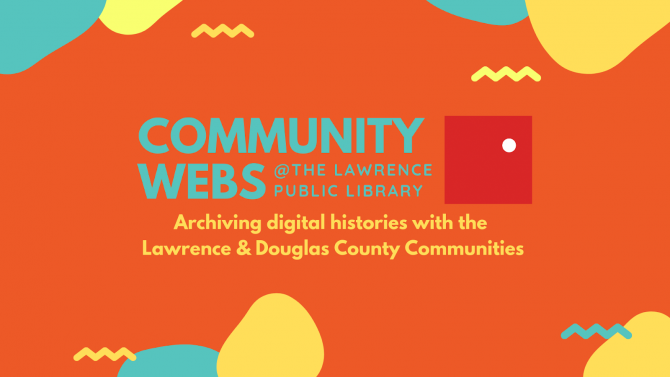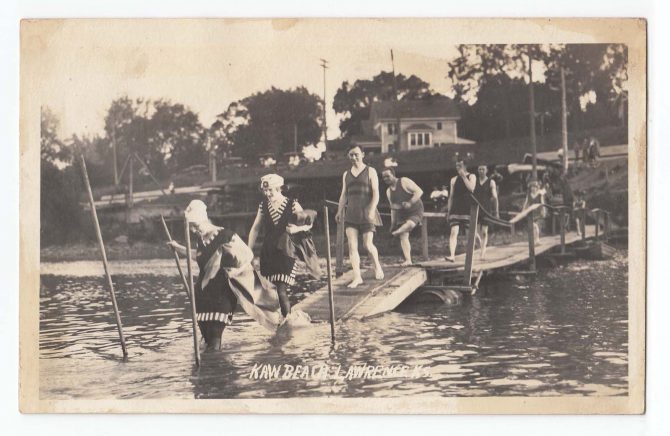If you’ve spent an afternoon jumping into the Kaw River, seeking relief from the heat of summer while wearing heavy denim overalls from a long day of work, you’ll understand why the residents of North Lawrence (who lovingly call themselves the Sand Rats and, back in the day, preferred dungarees to overalls) referred to residents south of the Kaw as the blue bellies. But the chances are pretty darn good that you haven’t encountered this scenario because even when the Kaw has been lower than its current level, these days swimming is still inadvisable because of contaminated waters.
Over the last few weeks, I’ve had the privilege of listening as community members share their stories with me, often guiding me to another person who has an entirely different perspective on life in Lawrence and Douglas County. Most of these histories are not captured in books, museum exhibits, or newspaper articles. Most of what is happening in Lawrence is grassroots, a thing about Lawrence that has made me, as well as many of you, fall in-love with this place. But these moments in history, when we do not seek out the polluted River as a refuge from the heat, ought to be preserved for future generations to learn about, as do the stories of the days when community events often involved a plunge into the Kaw.
Much like the rapidly changing river conditions, how we share stories and gather information has shifted drastically. The web now serves as the primary resource, with a societal reliance on social media, blogs, and digital news sources to cover cultural events and narratives. But did you know that the average website remains unchanged for only 90 days? As a troglodyte, I was surprised to learn this. I’ve always assumed that once information is on the web, it will stay there forever. In reality, the permanence of information we share on digital platforms is largely in the hands of tech giants. This ephemeral nature of the internet can skew future perspectives of history and, as has always been the case, who has the power to determine what is preserved.
The current cultural climate needs to be archived. The current cultural climate needs to be archived. I, in part, write and repeat this sentence to convince myself. I’ve long had an interest in learning about the past. An interest that has led me many directions from working on paleontology sites studying the bones of giant ground sloths that roamed the earth 150,000 years ago to participating in community archaeology sites in the arctic. Throughout each of these encounters, I have ruminated on this desire to understand the lives of others, human and non-human, that have inhabited these lands long before us. In these reflections, I frequently find myself questioning my work, knowing the contentious history that accompanies the recording of history. A dark shadow, always present, reminding us of the often ill intentions that prompt collecting narratives.
As Lawrence community members spend their time sharing copies of alternative local newspapers they created, such as the Plumber’s Friend or Public Notice, this preservation sentiment resurfaces. The current cultural climate needs to be archived. But how can this happen ethically? How can an archival process address concerns about what it means to have stories taken and utilized in manipulative ways?
My hope is that this is where the Community Webs project enters. As a Hall Center Fellow, I am working with the library on this project to connect with as many organizations and individuals as possible this summer. Community Webs is a deliberate community-based practice concerned with ensuring public access to information through the process of archiving online content about what it means to be alive in this place right now. Archiving captures and preserves web-based information that is in the public domain, creating trusted, reliable citations. It preserves community histories, guaranteeing that everyone can have continual, free access to information in perpetuity.
How do we decide what is pertinent? Well, we don’t. You do.
My role is to listen as you tell me which public social media feeds, websites, YouTube channels, blogs etc. give voice to what is happening in Lawrence. This process is, and has to be, guided by Lawrence and Douglas County community members in order to become an inclusive archive that holistically captures the entirety of the current climate.
I’ve already met with some of you over a cup of coffee, at your organization's meeting, on the lawn of the library, and for a walk on the levee of that rapidly changing river of ours. Each experience has helped the list of websites to be archived grow immensely. Each story you tell me and each new direction you point me makes that voice ring out louder: The current cultural climate needs to be archived! I look forward to continuing this process, always being guided by the community as we preserve these stories for future generations.

To view some of the content that has already been archived, visit:
https://archive-it.org/home/lawrencepubliclibrary
If there’s anything you’d like help digitizing so that it can be archived, consider coming to our Community Webs event July 18th-20th:
https://www.facebook.com/events/616976538801670/
If you have any questions about this project, would like to grab coffee and share your thoughts, or would like me to attend a meeting and bring information about Community Webs, please email me, Kaitlin Stanley, at hcintern@lplks.org.
-Kaitlin Stanley is the Hall Center Intern at Lawrence Public Library.




Add a comment to: Preserving the Web that Our Community Weaves